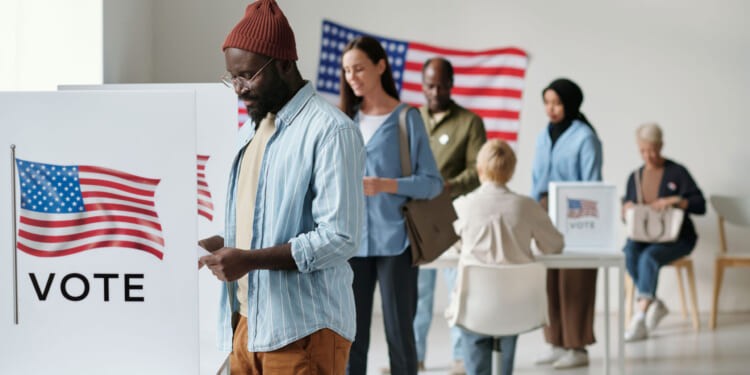The New York City legislature, following in the footsteps of Washington, D.C., passed a groundbreaking bill into law in 2022. The law would have allowed any lawful permanent resident or green card holder to vote in a New York City election. That law was met with legal challenges as quickly as it was passed, which was to be expected, given that it flagrantly infringed upon the state’s constitution.
The Constitution of New York states unequivocally, “every citizen shall be entitled to vote … .” This provision’s meaning is so obvious that it has been painful to see the far-left liberal New York City Council pass a law that violates it. It is evident that the New York City legislature misplaced its reading glasses, as they would not have enacted a law that contradicts the New York Constitution in such a bizarre way.
The majority opinion, authored by appellate Judge Paul Wooten, stated, “The plain language of this provision provides that the right to vote in ‘every election for all officers elected by the people’ is available exclusively to citizens.”
Unsurprisingly, pro-immigrant organizations denounced the decision, calling it “shameful” and saying it “disenfranchise[s] residents.” Disenfranchises? Really? This remark is as illogical as it is absurd. The only people disenfranchised by this law are United States citizens.
Voter disenfranchisement entails impeding an individual’s ability to exercise his or her right to vote or diminishing the value of his or her vote. The reason the Electoral College is reviled by the Left is because, according to their worldview, it confers greater value on specific votes than others, especially in smaller states.
The right to vote is sacred. However, the Left has forgotten that it must be earned, not given. Not earned in the conventional sense of passing a test to acquire, like the racist literacy tests of the past; rather, acquired through enduring the complexities and challenges associated with being a citizen. Becoming a citizen is not a simple task. Individuals must either be so lucky as to be born in the United States, or endure a laborious and sometimes yearslong application process.
There are discernible indicators in both processes that demonstrate an individual is prepared and deserving of the right to vote.
A person born in the United States has lived and grown in that country. He or she has gone through the government-mandated educational system and complied with the laws of this country for his or her entire lives. They have fulfilled their responsibilities through compliance and, in the case of some, hardship brought upon by our laws.
Individuals who obtain citizenship have demonstrated their readiness to undertake substantial obligations and sacrifices to integrate into a foreign nation. They have sworn allegiance to a new nation after navigating a complex legal system, and many have become proficient in a foreign language.
Nothing of the sort applies to noncitizens. There are undoubtedly many noncitizens loyal to this country, but they, like everyone else, must undergo the same process to demonstrate that they have earned the right to vote. It is inequitable to accord equal weight to the votes of transient individuals who enter the country for economic purposes, return their funds to their country of origin, or who are mere public charges, in comparison to those who have sworn allegiance to the United States and who have gone through the process to become a citizen.
Through the news, we tragically witness the disloyal individuals who come here and commit heinous acts daily. Migrants assaulting police officers, MS-13 gangs wreaking havoc on the population, migrants stabbing innocent people in Georgia. These tragedies have become routine occurrences. Should these individuals, whose sole intention is to cause harm or act selfishly, be permitted to vote? Undoubtedly not.
Should individuals who immigrate in pursuit of economic prosperity gain the right to vote? Eventually, but only after enduring the same trials and tribulations that each and every American has also endured.
The foundation of the United States is immigration. Each of us is an immigrant in some capacity. Our right to vote has been acquired through either our unwavering allegiance to the United States or our successful completion of the trials and systems established by the country. If an individual claims your vote lacks significance, you should explain the arduous journey you undertook to earn that privilege and the actions you undertook as a citizen. It just might persuade someone to reconsider their position.
COPYRIGHT 2024 CREATORS.COM
The Daily Signal publishes a variety of perspectives. Nothing written here is to be construed as representing the views of The Heritage Foundation.
Have an opinion about this article? To sound off, please email [email protected] and we’ll consider publishing your edited remarks in our regular “We Hear You” feature. Remember to include the url or headline of the article plus your name and town and/or state.

